外研版(2019)必修 第一册Unit 4 Friends foreverUnit4 定语从句详解课件 (共42张PPT)
文档属性
| 名称 | 外研版(2019)必修 第一册Unit 4 Friends foreverUnit4 定语从句详解课件 (共42张PPT) |
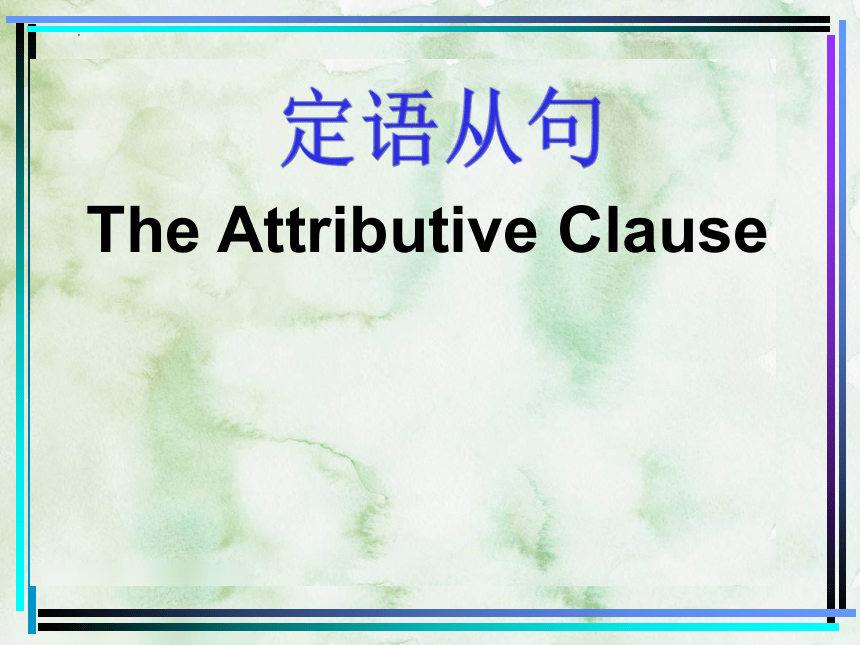
|
|
| 格式 | pptx | ||
| 文件大小 | 703.1KB | ||
| 资源类型 | 教案 | ||
| 版本资源 | 外研版(2019) | ||
| 科目 | 英语 | ||
| 更新时间 | 2023-04-03 12:05:23 | ||
图片预览

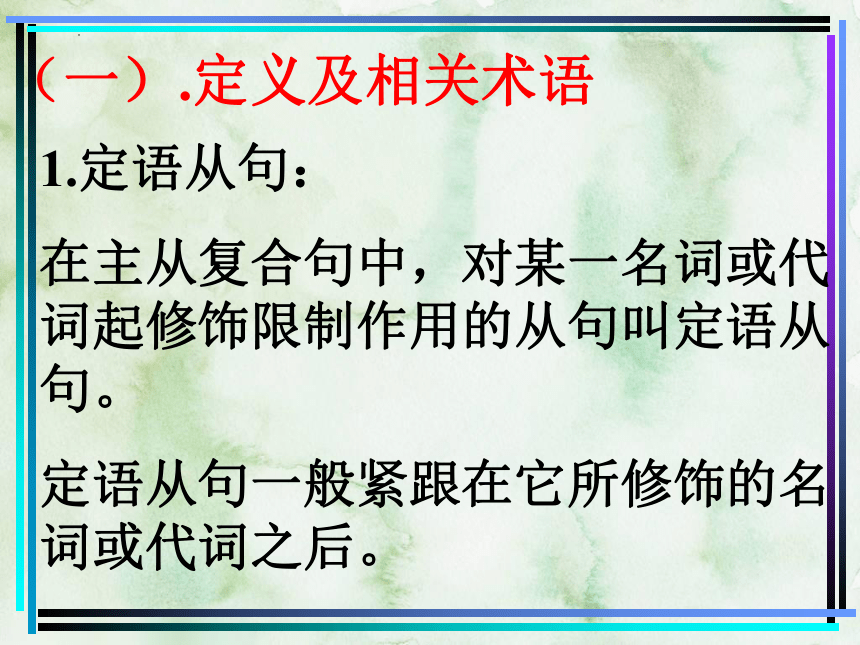
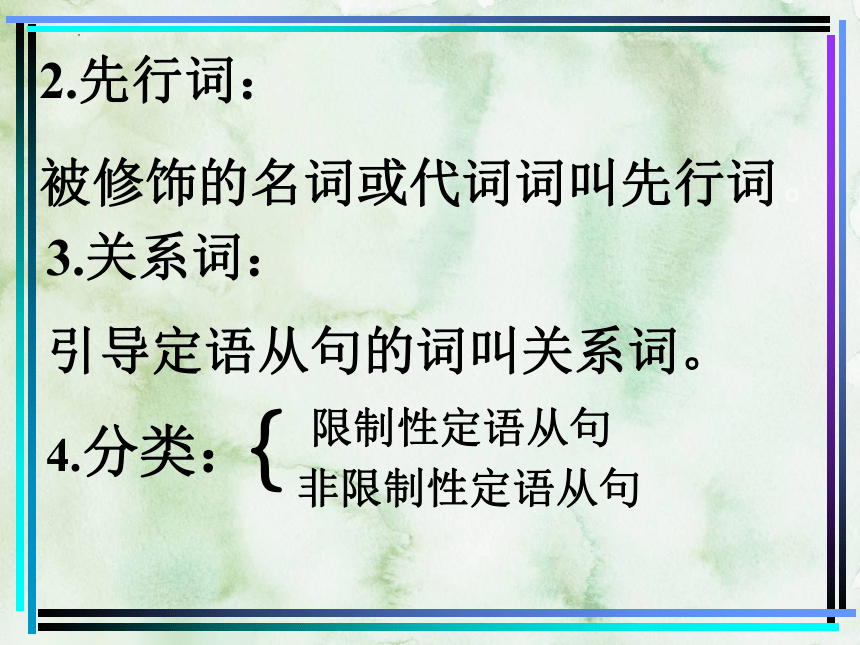
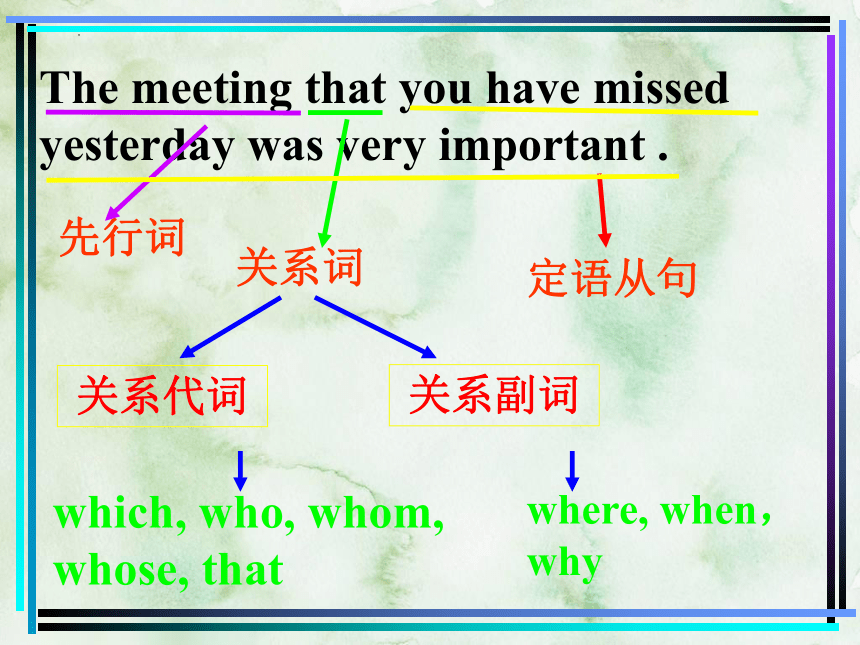
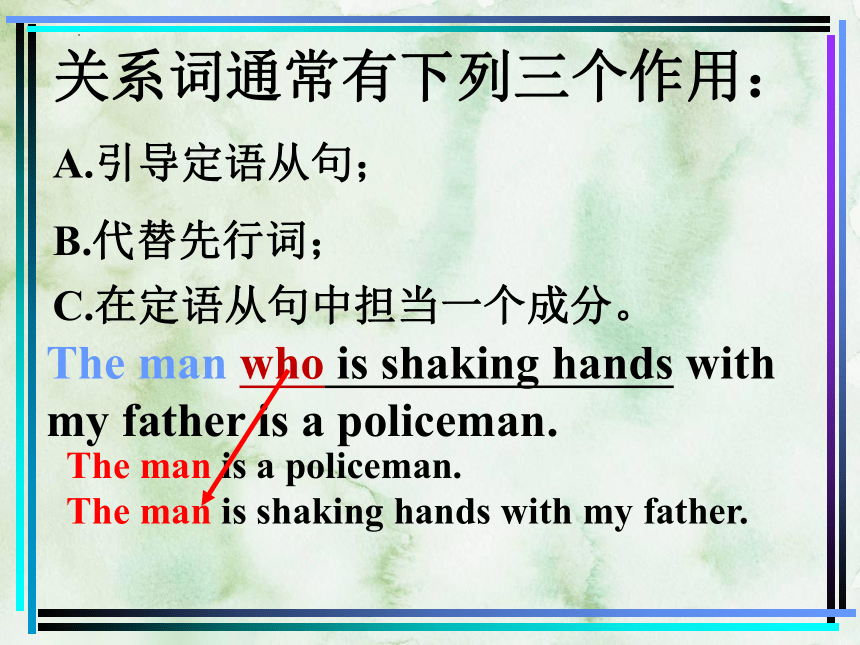
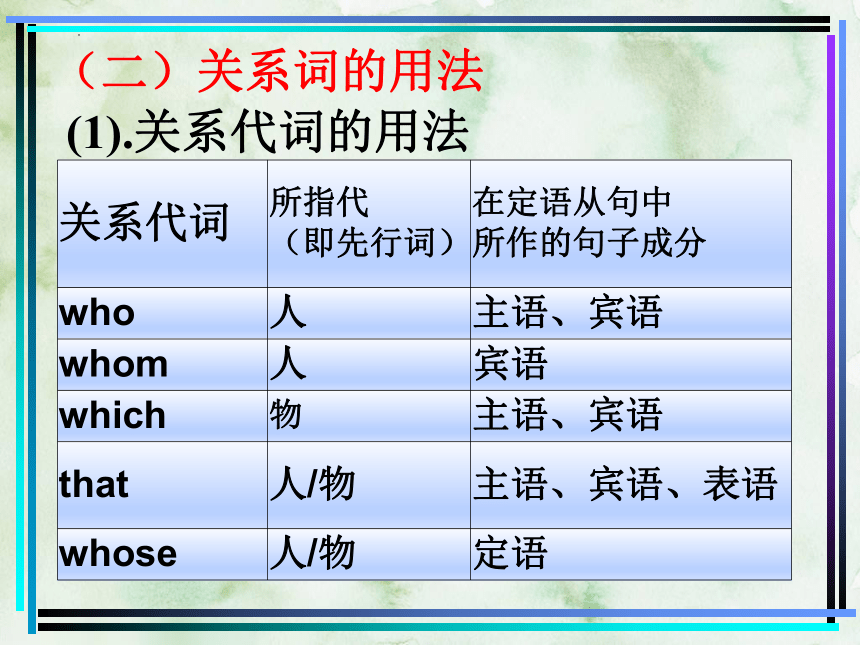
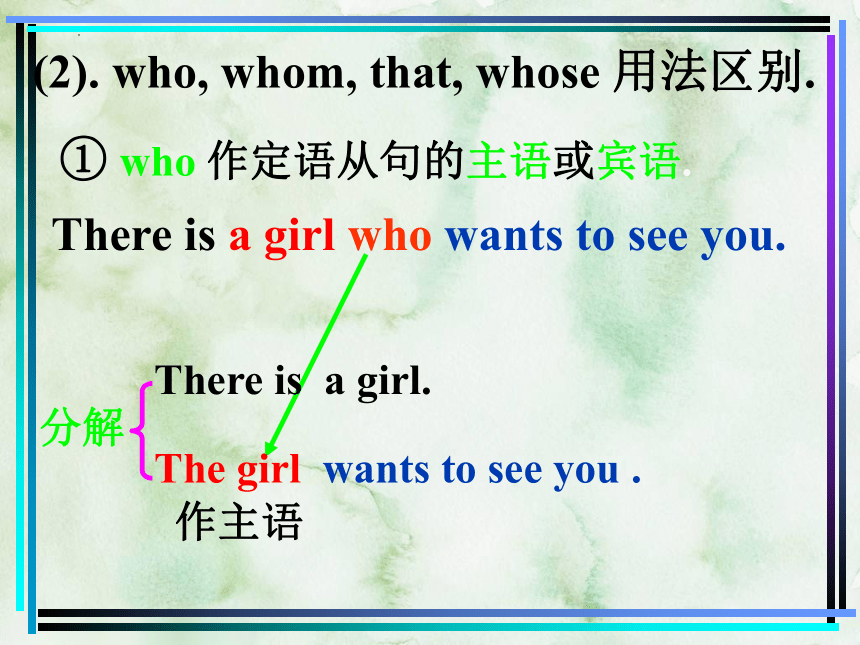
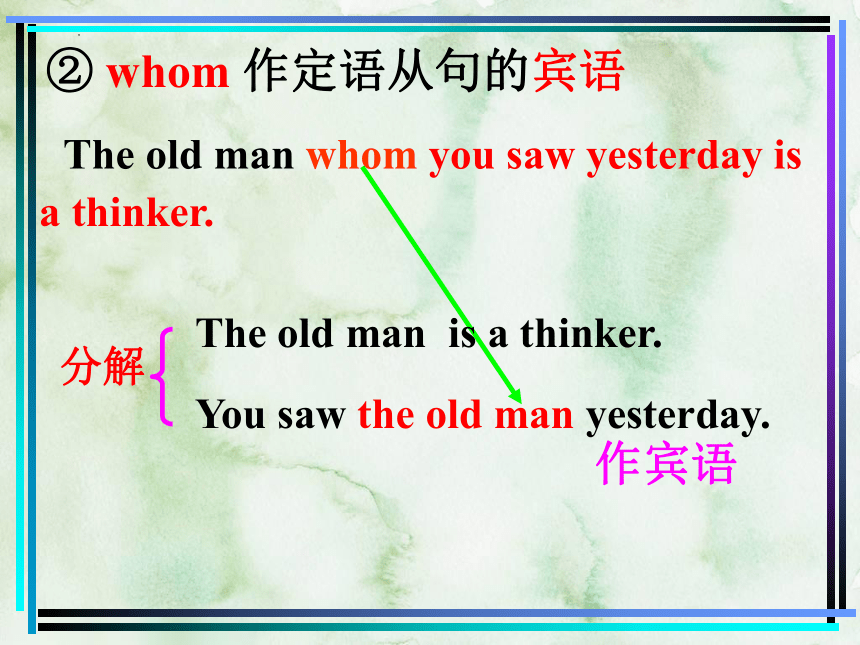
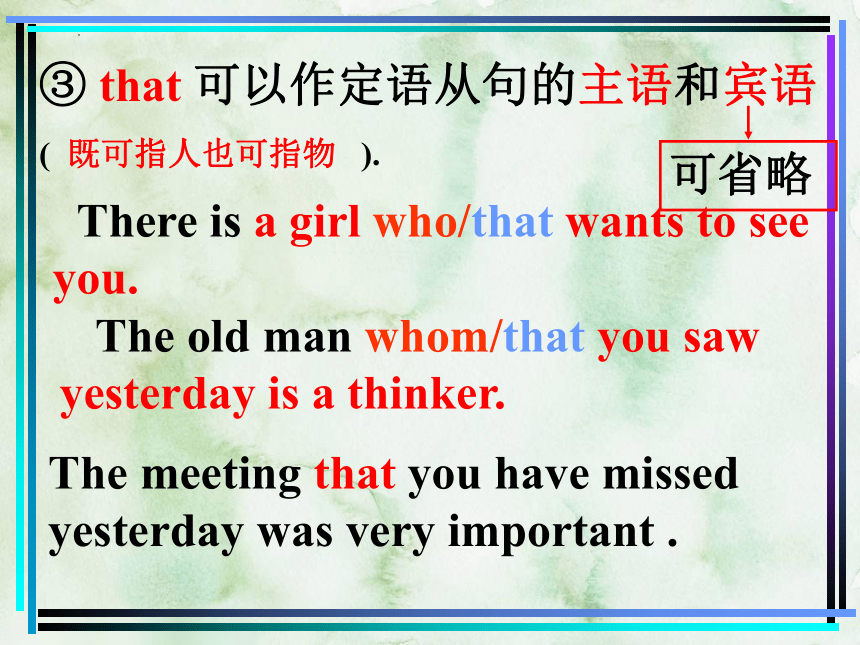
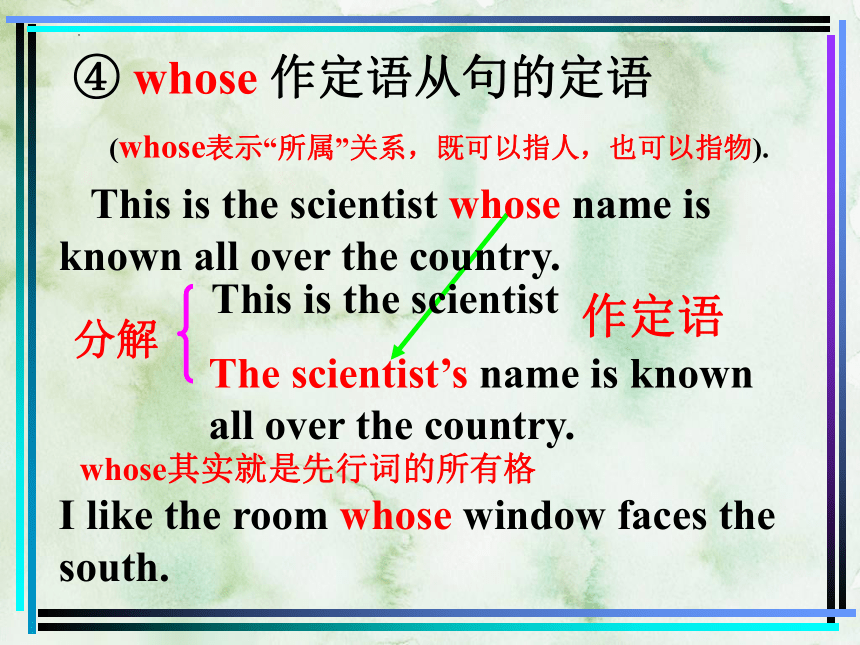
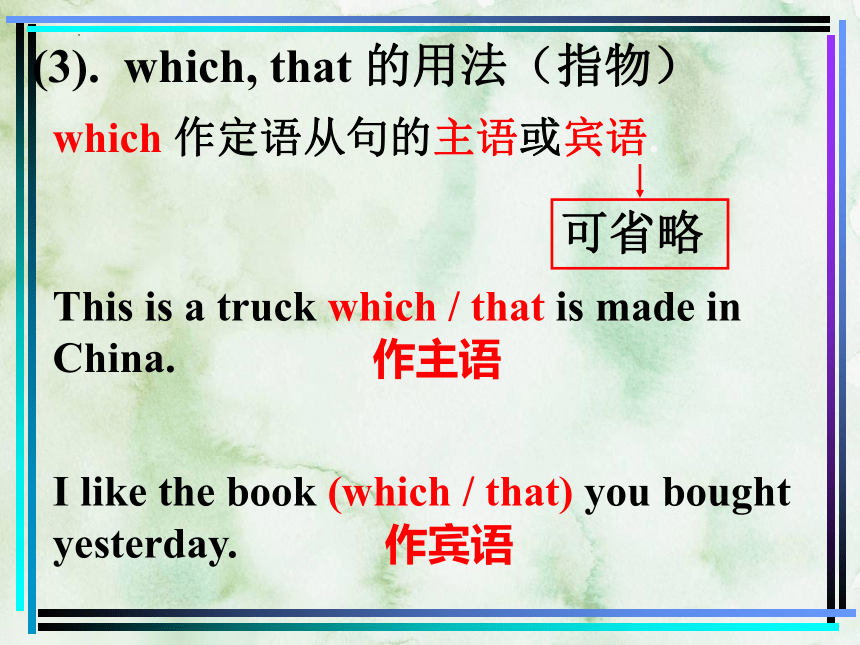
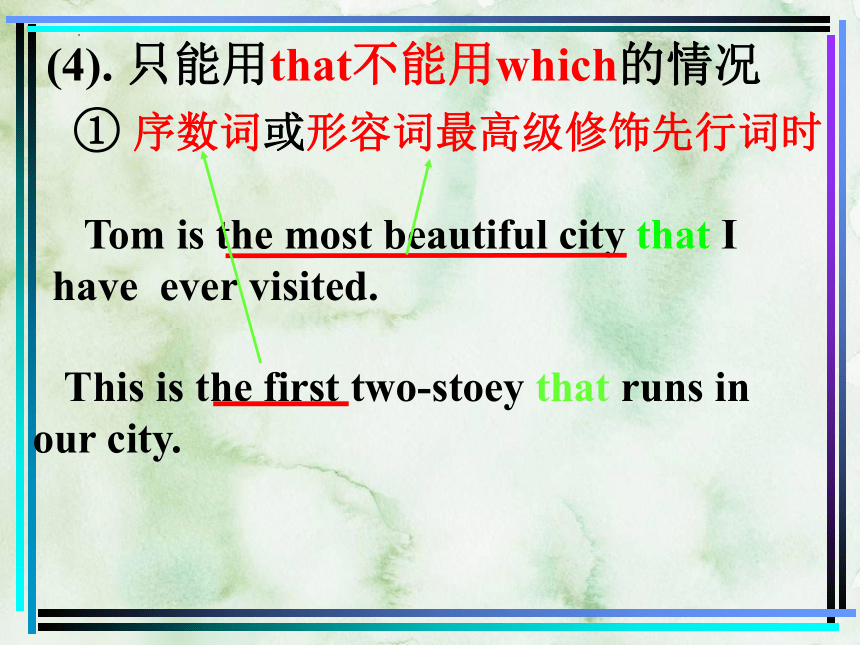
文档简介
(共42张PPT)
The Attributive Clause
定语从句
(一).定义及相关术语
1.定语从句:
在主从复合句中,对某一名词或代词起修饰限制作用的从句叫定语从句。
定语从句一般紧跟在它所修饰的名词或代词之后。
2.先行词:
被修饰的名词或代词词叫先行词。
3.关系词:
引导定语从句的词叫关系词。
4.分类:
{
限制性定语从句
非限制性定语从句
The meeting that you have missed yesterday was very important .
先行词
关系词
定语从句
关系代词
关系副词
which, who, whom, whose, that
where, when,why
关系词通常有下列三个作用:
A.引导定语从句;
B.代替先行词; C.在定语从句中担当一个成分。
The man who is shaking hands with my father is a policeman.
The man is a policeman.
The man is shaking hands with my father.
(二)关系词的用法
(1).关系代词的用法
关系代词 所指代 (即先行词) 在定语从句中
所作的句子成分
who 人 主语、宾语
whom 人 宾语
which 物 主语、宾语
that 人/物 主语、宾语、表语
whose 人/物 定语
(2). who, whom, that, whose 用法区别.
① who 作定语从句的主语或宾语.
There is a girl who wants to see you.
There is a girl.
The girl wants to see you .
分解
作主语
② whom 作定语从句的宾语
The old man whom you saw yesterday is a thinker.
The old man is a thinker.
You saw the old man yesterday.
分解
作宾语
③ that 可以作定语从句的主语和宾语
( 既可指人也可指物 ).
The old man whom/that you saw yesterday is a thinker.
可省略
There is a girl who/that wants to see you.
The meeting that you have missed yesterday was very important .
④ whose 作定语从句的定语
(whose表示“所属”关系,既可以指人,也可以指物).
This is the scientist whose name is known all over the country.
分解
This is the scientist
The scientist’s name is known all over the country.
作定语
I like the room whose window faces the south.
whose其实就是先行词的所有格
(3). which, that 的用法(指物)
which 作定语从句的主语或宾语.
I like the book (which / that) you bought yesterday.
This is a truck which / that is made in China.
作主语
作宾语
可省略
(4). 只能用that不能用which的情况
① 序数词或形容词最高级修饰先行词时
Tom is the most beautiful city that I have ever visited.
This is the first two-stoey that runs in our city.
Everything that we saw in this film was true.
②当先行词为every, some, no, all, any, little, much,everything, something, nothing, anything,等不定代词或先行词被这些词修饰时。
I’ve read all the books that you lend me.
③ 先行词被the only, the very, the same, the last修饰时。
This is the very book that belongs to him.
④ 当主语是以who或which开头的疑问句时,为避免重复而用that
Who is the girl that is standing under the tree
Which is the machine that we used last Sunday.
⑤当先行词既有人又有物时
Can you tell me the people and events that you saw in Britain
⑥当先行词在定于从句中作表语时。
The village is no longer the one that it was 5 years ago.
4.关系代词前有介词时 (介词提前) .指人只用whom, 指物只用which
This is the boy with whom he talked.
This is the ring on which she spent 1000 dollars.
主语 宾语 定语
指人 who that whom(优先) who that whose
(of whom)
指物 Which that Which that Whose
(of which)
指人和物 that that whose
引导定语从句的关系代词
when, where, why关系副词先行词在从句中的成分when表示时间的名词时间状语where表示地点的名词地点状语whyreason原因状语(三)引导定语从句的关系副词1.关系副词when引导定语从句时,先行词应时表示时间的名词,关系词在从句中作时间状语。
(1).There comes a time when children need to know more than the basic facts of life.
(2).You know these last few months when we’ve been expecting it to warm up a little bit
2.关系副词where引导定语从句时,先行词应是表示地点或抽象地点的名词,关系词在从句中作地点状语。
I want to work in a company where I can display my ability,and I hope to have an opportunity to develop my abilities.
Bamboo grows best in places where it is warm and where it often rains.
表示抽象的地点的名词point,scene,situation,condition,case,stage等作先行词时,其后的定语从句常用where.
The players must reach a point where they can be better prepared and carry the team forwards.
He has reached the best stage where he thinks he can get over any problem in learning English.
3.关系副词why引导定语从句时,先行词常常为reason,关系词在从句中作原因状语。
The reason why one is fat is partly caused by overeating.
造成肥胖的部分原因是饮食过多。
I don't know the reason why you were absent from the meeting.
我不知道你为什么缺席会议。
(四)关系代词和关系副词的区别关系代词在定语从句中作主语、宾语关系副词在定语从句中作状语(五)如何选用定语从句的关系词
1.首先分清主句和定语从句
2.确定定语从句的先行词
3.把先行词带回到定语从句中去,看其在定语从句中做什么语法成分(主语,宾语,定语或状语)
4.若先行词在从句中做主语、宾语或定语则选择关系代词,若在从句中做状语,则选择关系副词。
(六)限制性定语从句与非限制性定语从句
1. 限制性定语从句对先行词起限制、确定的作用,是先行词不可缺少的定语,如果省去,主句的意思就会不完整,不明确或不合逻辑。这种定语从句和主句之间不能用逗号隔开。
The man who came here yesterday has come again.
关系副词when和why用于引导限制性定语从句时,在口语和非正式文体中可以省去,但是where通常不可以省去。如:
a. Be sure to call on us next time (when)
you come to town.
b. This is one of the reasons (why) you may
like to eat it.
2. 非限制性定语从句和先行词关系松散,只是对先行词作附加说明,如果省去,主句的意思仍然完整或清楚。这种定语从句和主句之间须用逗号隔开。如:
a. Abraham Lincoln, who led the United States through these years, was murdered on April 14, 1865.
b. He sent a special governor, a man named Gessler, who would rule with a firm hand.
__________
___________________
c. He lives in another town, which is only about an hour’s ride from here.
d. Soon they arrived at a farm house, in front of which sat a small boy.
注意:引导非限制性定语从句的关系代词
不可用that,指人时用who(主语),whom
(宾语),指物时须用which.
Find the difference
A:His brother, who is eighteen years old, is a PLA man.
B:His brother who is eighteen years old is a PLA man.
区别:A句:他的哥哥是个解放军战士,现今十八岁。(说明他只有一个哥哥)
B句:他那个十八岁的哥哥是位解放军。(说明他还有别的哥哥)
限制性定语从句 非限制性定语从句
形式上 不用逗号“,”与主句隔开。 用逗号“,”与主句隔开。
意义上 是先行词不可缺少的定语,如删除,主句则失去意义或意思表达不完整。 只是对先行词的补充说明,如删除,主句仍能表达完整的意思。
译法上 译成先行词的定语:“...的” 通常译成主句的并列句。
关系词的使用上 A.作宾语时可省略 B.可用that C.可用who 代替whom A.不可省略
B.不用that
C.不可用who 代替whom
关系副词
when=on(in,during…)which
where=on(in,in front of…)which
why=for which
(七)关系副词与介词+关系代词的替代
“介词+which”在定于从句中分别可做时间,地点和原因状语代替相应的关系副词我很,when,where和why。
whenwhen可用in/on/at/during +which代替1.I still remember the day.2.I first went toChinaonthe day.I still remember the dayon whichI first wen to China.whenwhichwherewhere可用in/on/at/to + which代替1.I want to work in a company.I can display my abilityinthe company..I want to work in a company in whichI can display my ability.wherewhich.whywhy可用for +which代替1.This is the reason.2.I was late for school for this reason.This is the reason for which I waslate for school.whywhich.介词+关系代词的集中常见结构:
1.“代词/数词+of+which/whom”引导非限制性定语从句。这个结构中,代词常常为all,each,one,many,much,most,some,none,both 等
“代词+of+which/whom”通常在定语从句中作主语,说明整体中的一部分。有时候也可把“of+which/whom”置于代词或数词前。
The old man has two sons,both of whom are lawyers.
这位老人有两个儿子,两个儿子都是律师。
2.“the+名词+of which/whom”引导非限制性定语从句。
这个结构中,of which/whom充当定语,修饰前面的名词,整个结构相当于“whose”引导的定语从句。
有时候也可将“of+which/whom”置于前面。
Look at the building, the roof of which (=whose roof=of which the roof) is white.
看那座楼房,它的屋顶是白色的。
3.“the+形容词比较级(最高级)+of+which/whom”引导非限制性定语从句。
There are two buildings,the larger of which stands nearly a hundred feet height.
这儿有两座建筑物,较大的那座几乎有100英尺高。
4.关系代词+介词结构中介词的选择:
介词的选择可以总结为“一先、二动、三意义”。
1.一先,即看先行词,从先行词入手。介词往往和先行词构成固定搭配。(比如时间常和on,in ,by 搭配;地点常用on,in,at;原因用for;方式用in,by,with等)
This is the house in which (where) the inventor lived.
这就是那位发明家住过的房子。
2.二动,即看从句中的谓语动词结构。根据从句中谓语动词的搭配选择合适的介词。
He is the person of whom everyone has
heard.(hear of 听说)
他就是那个所有人都听说过的人。
3.三意义:通过判断主句表达的全部意义来确定合适的介词。
My computer, without which I can't surf the Internet,broke down yesterday.
昨天我的由脑坏了。没有它我不能网上冲浪。
Thank you !
Bye-bye
The Attributive Clause
定语从句
(一).定义及相关术语
1.定语从句:
在主从复合句中,对某一名词或代词起修饰限制作用的从句叫定语从句。
定语从句一般紧跟在它所修饰的名词或代词之后。
2.先行词:
被修饰的名词或代词词叫先行词。
3.关系词:
引导定语从句的词叫关系词。
4.分类:
{
限制性定语从句
非限制性定语从句
The meeting that you have missed yesterday was very important .
先行词
关系词
定语从句
关系代词
关系副词
which, who, whom, whose, that
where, when,why
关系词通常有下列三个作用:
A.引导定语从句;
B.代替先行词; C.在定语从句中担当一个成分。
The man who is shaking hands with my father is a policeman.
The man is a policeman.
The man is shaking hands with my father.
(二)关系词的用法
(1).关系代词的用法
关系代词 所指代 (即先行词) 在定语从句中
所作的句子成分
who 人 主语、宾语
whom 人 宾语
which 物 主语、宾语
that 人/物 主语、宾语、表语
whose 人/物 定语
(2). who, whom, that, whose 用法区别.
① who 作定语从句的主语或宾语.
There is a girl who wants to see you.
There is a girl.
The girl wants to see you .
分解
作主语
② whom 作定语从句的宾语
The old man whom you saw yesterday is a thinker.
The old man is a thinker.
You saw the old man yesterday.
分解
作宾语
③ that 可以作定语从句的主语和宾语
( 既可指人也可指物 ).
The old man whom/that you saw yesterday is a thinker.
可省略
There is a girl who/that wants to see you.
The meeting that you have missed yesterday was very important .
④ whose 作定语从句的定语
(whose表示“所属”关系,既可以指人,也可以指物).
This is the scientist whose name is known all over the country.
分解
This is the scientist
The scientist’s name is known all over the country.
作定语
I like the room whose window faces the south.
whose其实就是先行词的所有格
(3). which, that 的用法(指物)
which 作定语从句的主语或宾语.
I like the book (which / that) you bought yesterday.
This is a truck which / that is made in China.
作主语
作宾语
可省略
(4). 只能用that不能用which的情况
① 序数词或形容词最高级修饰先行词时
Tom is the most beautiful city that I have ever visited.
This is the first two-stoey that runs in our city.
Everything that we saw in this film was true.
②当先行词为every, some, no, all, any, little, much,everything, something, nothing, anything,等不定代词或先行词被这些词修饰时。
I’ve read all the books that you lend me.
③ 先行词被the only, the very, the same, the last修饰时。
This is the very book that belongs to him.
④ 当主语是以who或which开头的疑问句时,为避免重复而用that
Who is the girl that is standing under the tree
Which is the machine that we used last Sunday.
⑤当先行词既有人又有物时
Can you tell me the people and events that you saw in Britain
⑥当先行词在定于从句中作表语时。
The village is no longer the one that it was 5 years ago.
4.关系代词前有介词时 (介词提前) .指人只用whom, 指物只用which
This is the boy with whom he talked.
This is the ring on which she spent 1000 dollars.
主语 宾语 定语
指人 who that whom(优先) who that whose
(of whom)
指物 Which that Which that Whose
(of which)
指人和物 that that whose
引导定语从句的关系代词
when, where, why关系副词先行词在从句中的成分when表示时间的名词时间状语where表示地点的名词地点状语whyreason原因状语(三)引导定语从句的关系副词1.关系副词when引导定语从句时,先行词应时表示时间的名词,关系词在从句中作时间状语。
(1).There comes a time when children need to know more than the basic facts of life.
(2).You know these last few months when we’ve been expecting it to warm up a little bit
2.关系副词where引导定语从句时,先行词应是表示地点或抽象地点的名词,关系词在从句中作地点状语。
I want to work in a company where I can display my ability,and I hope to have an opportunity to develop my abilities.
Bamboo grows best in places where it is warm and where it often rains.
表示抽象的地点的名词point,scene,situation,condition,case,stage等作先行词时,其后的定语从句常用where.
The players must reach a point where they can be better prepared and carry the team forwards.
He has reached the best stage where he thinks he can get over any problem in learning English.
3.关系副词why引导定语从句时,先行词常常为reason,关系词在从句中作原因状语。
The reason why one is fat is partly caused by overeating.
造成肥胖的部分原因是饮食过多。
I don't know the reason why you were absent from the meeting.
我不知道你为什么缺席会议。
(四)关系代词和关系副词的区别关系代词在定语从句中作主语、宾语关系副词在定语从句中作状语(五)如何选用定语从句的关系词
1.首先分清主句和定语从句
2.确定定语从句的先行词
3.把先行词带回到定语从句中去,看其在定语从句中做什么语法成分(主语,宾语,定语或状语)
4.若先行词在从句中做主语、宾语或定语则选择关系代词,若在从句中做状语,则选择关系副词。
(六)限制性定语从句与非限制性定语从句
1. 限制性定语从句对先行词起限制、确定的作用,是先行词不可缺少的定语,如果省去,主句的意思就会不完整,不明确或不合逻辑。这种定语从句和主句之间不能用逗号隔开。
The man who came here yesterday has come again.
关系副词when和why用于引导限制性定语从句时,在口语和非正式文体中可以省去,但是where通常不可以省去。如:
a. Be sure to call on us next time (when)
you come to town.
b. This is one of the reasons (why) you may
like to eat it.
2. 非限制性定语从句和先行词关系松散,只是对先行词作附加说明,如果省去,主句的意思仍然完整或清楚。这种定语从句和主句之间须用逗号隔开。如:
a. Abraham Lincoln, who led the United States through these years, was murdered on April 14, 1865.
b. He sent a special governor, a man named Gessler, who would rule with a firm hand.
__________
___________________
c. He lives in another town, which is only about an hour’s ride from here.
d. Soon they arrived at a farm house, in front of which sat a small boy.
注意:引导非限制性定语从句的关系代词
不可用that,指人时用who(主语),whom
(宾语),指物时须用which.
Find the difference
A:His brother, who is eighteen years old, is a PLA man.
B:His brother who is eighteen years old is a PLA man.
区别:A句:他的哥哥是个解放军战士,现今十八岁。(说明他只有一个哥哥)
B句:他那个十八岁的哥哥是位解放军。(说明他还有别的哥哥)
限制性定语从句 非限制性定语从句
形式上 不用逗号“,”与主句隔开。 用逗号“,”与主句隔开。
意义上 是先行词不可缺少的定语,如删除,主句则失去意义或意思表达不完整。 只是对先行词的补充说明,如删除,主句仍能表达完整的意思。
译法上 译成先行词的定语:“...的” 通常译成主句的并列句。
关系词的使用上 A.作宾语时可省略 B.可用that C.可用who 代替whom A.不可省略
B.不用that
C.不可用who 代替whom
关系副词
when=on(in,during…)which
where=on(in,in front of…)which
why=for which
(七)关系副词与介词+关系代词的替代
“介词+which”在定于从句中分别可做时间,地点和原因状语代替相应的关系副词我很,when,where和why。
whenwhen可用in/on/at/during +which代替1.I still remember the day.2.I first went toChinaonthe day.I still remember the dayon whichI first wen to China.whenwhichwherewhere可用in/on/at/to + which代替1.I want to work in a company.I can display my abilityinthe company..I want to work in a company in whichI can display my ability.wherewhich.whywhy可用for +which代替1.This is the reason.2.I was late for school for this reason.This is the reason for which I waslate for school.whywhich.介词+关系代词的集中常见结构:
1.“代词/数词+of+which/whom”引导非限制性定语从句。这个结构中,代词常常为all,each,one,many,much,most,some,none,both 等
“代词+of+which/whom”通常在定语从句中作主语,说明整体中的一部分。有时候也可把“of+which/whom”置于代词或数词前。
The old man has two sons,both of whom are lawyers.
这位老人有两个儿子,两个儿子都是律师。
2.“the+名词+of which/whom”引导非限制性定语从句。
这个结构中,of which/whom充当定语,修饰前面的名词,整个结构相当于“whose”引导的定语从句。
有时候也可将“of+which/whom”置于前面。
Look at the building, the roof of which (=whose roof=of which the roof) is white.
看那座楼房,它的屋顶是白色的。
3.“the+形容词比较级(最高级)+of+which/whom”引导非限制性定语从句。
There are two buildings,the larger of which stands nearly a hundred feet height.
这儿有两座建筑物,较大的那座几乎有100英尺高。
4.关系代词+介词结构中介词的选择:
介词的选择可以总结为“一先、二动、三意义”。
1.一先,即看先行词,从先行词入手。介词往往和先行词构成固定搭配。(比如时间常和on,in ,by 搭配;地点常用on,in,at;原因用for;方式用in,by,with等)
This is the house in which (where) the inventor lived.
这就是那位发明家住过的房子。
2.二动,即看从句中的谓语动词结构。根据从句中谓语动词的搭配选择合适的介词。
He is the person of whom everyone has
heard.(hear of 听说)
他就是那个所有人都听说过的人。
3.三意义:通过判断主句表达的全部意义来确定合适的介词。
My computer, without which I can't surf the Internet,broke down yesterday.
昨天我的由脑坏了。没有它我不能网上冲浪。
Thank you !
Bye-bye
